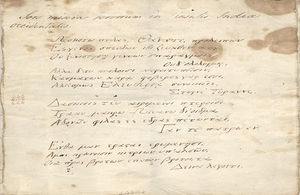Anti-slavery manuscript in ancient Greek by Coleridge at risk of leaving UK
Export bar placed on autograph manuscript poem in ancient Greek signed and dated 16 June 1792 to allow time for a UK institution to acquire the work

An anti-slavery poem written by the poet Samuel Taylor Coleridge is at risk of leaving the UK unless a domestic buyer can be found.
Coleridge (1772-1834), one of the leading figures of the Romantic movement in England, wrote the Greek verses while he was studying at the University of Cambridge and they are the only known draft of the work. He wrote the poem 15 years before the slave trade was abolished by Parliament.
The poem, a Greek Sapphic ode in 24 quatrains, titled ‘Sors misera servorum in insulis Indiae occidentalis’ (Ode on The West-Indian Slave Trade), discusses the evils of slavery and laments the fate of slaves on the Middle Passage transportation route. It won Coleridge the Browne Medal for Classical composition at the University of Cambridge.
The manuscript, which has been valued at £20,400, offers an insight into the early thinking of one of Britain’s most significant literary figures and is important for biographical studies of the poet, who wrote classic poems including The Rime of the Ancient Mariner and Kubla Khan.
Arts & Heritage Minister Lord Parkinson of Whitley Bay said:
‘’This fascinating manuscript offers an insight into the early thinking of one of Britain’s greatest poets, particularly on the heated debates on the abolition of slavery.
“I sincerely hope that a UK buyer can be found to ensure it can remain here in the UK where it can be studied and enjoyed by future generations.”
The Minister’s decision follows the advice of the Reviewing Committee on the Export of Works of Art and Objects of Cultural Interest.
Committee Member Peter Barber said:
“This insignificant-seeming, annotated draft of a poem in Greek is an emotive relic of one of this country’s greatest poets and sages. It dates back to the time when, as a Cambridge undergraduate in May-June 1792, Coleridge was hoping, by winning a university prize for the verse, to prove to his sceptical parents that he had the makings of a scholar. Its content reflects his heartfelt – and lifelong – commitment to one of the burning national issues of the time, the abolition of slavery, and he continued to refer to the poem throughout his life.
“The draft also throws light on his close but hitherto little explored relationship with his revered eldest brother, George, to whom he sent it for comment. For all these reasons I fervently hope that a way can be found to keep the draft poem in this country.’’
The committee made its recommendation on the basis the manuscript meets the first Waverley criterion for its outstanding connection with our history and national life. The poem’s subject, which focuses on the crucial movement campaigning for the abolition of slavery, adds to its outstanding significance to British history.
The decision on the export licence application for the manuscript will be deferred for a period ending on 16 May 2023. At the end of the first deferral period owners will have a consideration period of 15 Business Days to consider any offer(s) to purchase the relief at the recommended price of £20,400 (plus VAT of £4,080 which can be reclaimed by an eligible institution). The second deferral period will commence following the signing of an Option Agreement and will last for three months.
Notes to editors:
-
Organisations or individuals interested in purchasing the sculpture should contact the RCEWA on 0161 934 4317.
-
Details of the manuscript are as follows: Samuel Taylor Coleridge autograph manuscript poem, ‘Sors misera servorum in insulis Indiae occidentalis’ [Ode on The West-Indian Slave Trade], signed and dated 16 June 1792. 6 pages, 4to, written on rectos only, stab-stitched, with some patches of browning.
-
Provenance: Sent to the poet’s brother, the Rev. George Coleridge, in 1792; By descent (probably through his nephew the Rev. William Hart Coleridge) to:Betty Christabel Gertrude, Lady Cave (née Coleridge) (1895-1979);Her son Sir Charles Edward Coleridge Cave (1927-1997), who is acknowledged by Anthea Morrison as being the owner in 1983; Sotheby’s, London, 24 July 1995, Lot 64; Sotheby’s London, 12-19 July 2022, Lot 160, sold to the current owner.
-
The Reviewing Committee on the Export of Works of Art and Objects of Cultural Interest is an independent body, serviced by Arts Council England (ACE), which advises the Secretary of State for Culture, Media and Sport on whether a cultural object, intended for export, is of national importance under specified criteria.
-
Arts Council England is the national development agency for creativity and culture. Its strategic vision in Let’s Create is that, by 2030, England should be a country in which the creativity of everyone is valued and given the chance to flourish and where everyone has access to a remarkable range of high-quality cultural experiences. ACE invests public money from the government and the National Lottery to support the sector and deliver the vision.
-
Following the Covid-19 crisis, ACE developed a £160 million Emergency Response Package, with nearly 90 per cent coming from the National Lottery, for organisations and individuals needing support. It is also one of the bodies administering the government’s unprecedented Culture Recovery Fund.